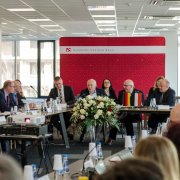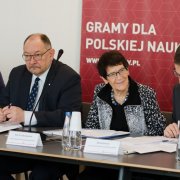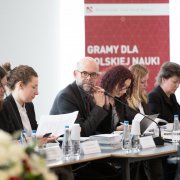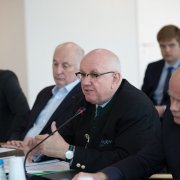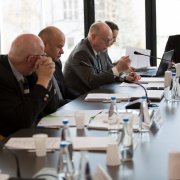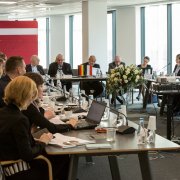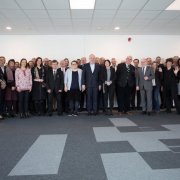Polish and German research funding and research performing agencies plan to intensify cooperation to support scientific excellence in both countries. They met in Kraków at the end of February and discussed existing mechanisms as well as ways to improve the regional research landscape.
The Second Polish-German Science Meeting held in Kraków was organized by the National Science Centre in Poland (NCN), German Research Foundation (DFG) and Foundation for Polish Science (FNP). During the meeting, heads of research agencies and research managers discussed how to foster Polish-German and European academic relations through excellence strategies and how should they be supported by bilateral mechanisms on the one hand, and EU-funding on the other.
The meeting was opened by Prof. Zbigniew Błocki, director of the National Science Centre, who set discussion points and questions to be touched upon during the roundtable discussion.
“Our guiding questions concentrate on key issues like excellence and science diplomacy. Of course the big subject of this meeting is bilateral Polish-German scientific cooperation but also the landscape of European Research Area as well as a discussion of those issues within new Framework Programme. We always should be aware of the European perspective.”
In the first part of the meeting, representatives of the invited institutions presented their excellence programmes and funding initiatives supporting research, e.g. Excellence Strategy ExStra (DFG), Centres of Excellence by FNP, DIOSCURI by the Max Planck Society (MPG) and NCN, mobility related schemes by the Polish National Agency for Academic Exchange (NAWA), as well as network-related initiatives such as Strategic Partnerships & Networks by German Academic Exchange Service (DAAD), Leibniz Network Eastern Europe by the Leibniz Association or Central European Science Partnership CEUS presented by the NCN. During the roundtable discussion, other participants briefly reported on programmes and initiatives established by their organisations: the Polish Academy of Sciences, the German-Polish Science Foundation (DPWS), the Helmholtz Association, German’s Rectors Conference (HRK) and the Conference of Rectors of Academic Schools in Poland (CRASP) and others. As a result, those at the meeting gained a clear picture of the landscape of Polish-German funding opportunities and support mechanisms for researchers.
In the second part of the discussion, central questions were reformulated. Support mechanisms for Polish-German cooperation were discussed: should they be large-scale ventures or small-scale but flexible support programmes? Should excellence schemes be given priority or should the portfolio of programmes intended to support a broad range of scientific projects be developed? It was suggested that the funding system should be structurally pluralistic. In order to increase each country’s capacity and be able to answer questions the existence of which we have no idea of yet, we should fund curiosity-driven blue skies research.
During the discussion an important opinion shared by the meeting attendees was articulated that, within a pluralistic system, the structures and funding for researchers need to be stable and long-lasting. Since the most important factors for the quality of science are the people, there is a substantial need to support researchers in a more stable way and offer them a long-term perspective.
The discussion concentrated then on excellence in science. It was clearly stated that excellence initiatives have an enormous influence on society. Since excellence is not equally distributed in Europe, it is of the utmost importance to reflect on our funding schemes with regard to excellence. There is a need for a benchmark system in European science. Excellence based initiatives within Polish-German collaborations, such as, e.g. Dioscuri or the COPERNICUS Award are relevant instruments for achieving this goal.
During the meeting, the relevance of Polish-German cooperation within the European Research Area was addressed. The discussion brought various observations and ideas on how to act proactively: strengthening bilateral collaboration, creating macroregional research support initiatives and efficiently using EU funding opportunities to foster widening as well as regional, pluralistic cooperation, that in consequence will help to maintain the quality of the selection. On the basis of this existing trustful and well organized Polish-German cooperation, representatives of both countries should cooperate in Brussels more closely to address their joint interests.
Last but not least, all participants agreed that bilateral cooperation gives all the funding bodies the necessary basis for mutual trust.
The Second Polish-German Science Meeting was preceded by a reception held at the German Consulate in Kraków, where the Consul General of Germany and the heads of NCN, DFG, FNP and MPG welcomed the guests and introduced the meeting with short speeches.
The Polish-German Science Meeting was organised for the second time, after the first stimulating and fruitful event organised in Munich in May 2017, by DFG, FNP and NCN. Polish-German research and academic collaboration is strong and has a big potential for building solid Central European research cooperation.
The third Polish-German Science Meeting is scheduled for 2020 and will take place in Germany.
Photographs: Michał Niewdana/NCN

